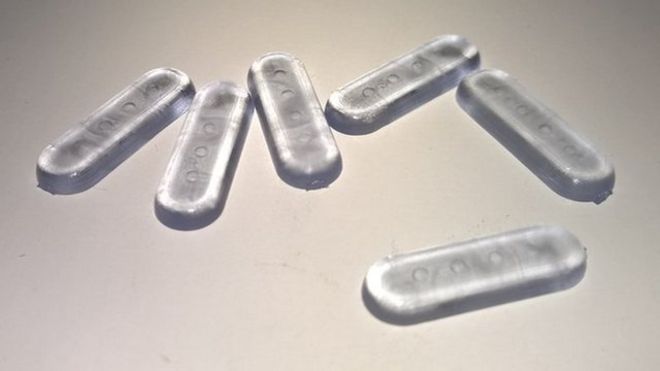Interesting article on the BBC about a company that is providing 3D barcode technology to help prevent counterfeit. They wont be ready until late 2016, luckily we can solve the same problem today.
http://www.bbc.com/news/science-environment-34200649
itrace’s patented 2DMI is capable of being applied to a pill today and is already protecting watches across 17 brands. It can also be read with standard cameras and imagers, even the iPhone.
3D barcodes target counterfeit drugs and devices
- 10 September 2015
- From the sectionScience & Environment
 Image copyrightBen Whiteside, University of Bradford
Image copyrightBen Whiteside, University of BradfordA UK team has developed 3D barcodes that could help tackle counterfeiting of drugs, watches and other devices.
The codes consist of a series of small indentations with precise, slightly different depths, allowing for billions of different combinations.
They are deciphered by a device that “reads” the dents using beams of light.
Because they are made using adjustable pins during the moulding process, a different code could be embedded in – for example – individual pills.
The system was developed by Sofmat Ltd, a small Yorkshire company, in collaboration with engineers at the University of Bradford. The team has now been awarded £250,000 by the government technology body Innovate UK – the final of three stages of funding, intended to see the product through to market readiness.
“In a batch process, you might have a QR code and every single tablet would have the same code on it,” said Sofmat director Dr Phil Harrison, “because when you’re trying to change something that big, it’s very difficult.”
By contrast, his team has concentrated on developing a “sequential marking” system.
 Image copyrightBen Whiteside, University of Bradford
Image copyrightBen Whiteside, University of Bradford“Within the mould cavity, there are a number of pins which are each moved by a micro-actuator. By changing the pin heights… you can put a different alphanumeric code on to each tablet.”
With four pins making holes at 36 possible heights, the team can produce 1.7 million codes. Next they want to step up to a six-pin system, with more height variation, which will allow 14 billion variations.
Fraudulent fortune
The global market in counterfeit goods, from medicines to motorbikes, is estimated to be worth $1.8bn (£1.2bn) every year. And that value is forecast to rise steeply in the next few years.
Speaking to journalists at the British Science Festival in Bradford, Dr Harrison said Sofmat worked with pharmaceutical companies in Switzerland to decide on the best way to develop the system commercially.
Because many pills are produced by injection moulding, the 3D barcodes could be incorporated into that process relatively easily.
Then, hospitals or pharmacies could purchase a scanner to verify medications. This will be a “little black box, with a slot the size of a tablet”, Dr Harrison said. His team hopes to have a prototype scanner finished by late 2016.
“The idea is… you put a tablet into it, the tablet’s scanned, then it comes out with a number. If that number corresponds to the number it should have, on the box, it tells you whether or not the tablet is real.”
The team is also looking at applying the codes to metal surfaces, which would be attractive for other well-known Swiss products.
“We are talking to watch manufacturers at the moment, about protecting those,” Dr Harrison said.
 Image copyrightThinkstock
Image copyrightThinkstockDr Elaine Brown, a senior lecturer in mechanical and process engineering at the University of Bradford, said that tackling counterfeiting was a major concern.
“The dangers of counterfeiting all sorts of products are really, really massive. It’s not just losing the profit of big business; it affects everybody.
“If you are taking some medication, you want to know that it is the real medication, not a copy which could actually harm you.”
The 3D barcode system, Dr Brown added, could also help address the problem in other industries – including food, electronics, medical implants and motor vehicles.
“Anything that uses moulded plastics and composites could integrate this type of barcode technology,” she said.
Follow Jonathan on Twitter

